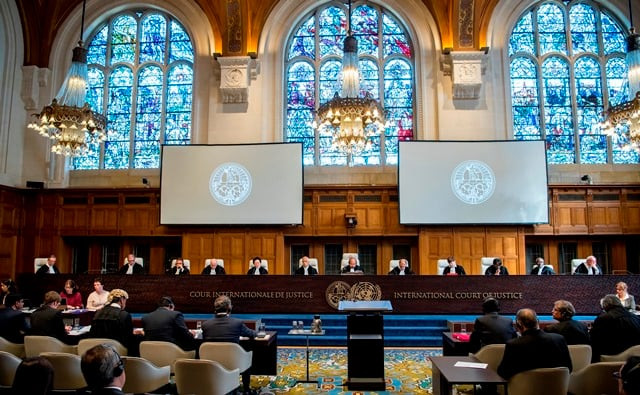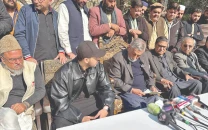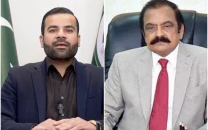Pakistan, India face off at The Hague
ICJ reserves judgment; Pakistan questions court’s jurisdiction; India reiterates claims of denial of rights

International Court of Justice holds hearing of the case. PHOTO: ICJ
India invoked the jurisdiction of this court improperly, Qureshi said. "This court exists to ensure that states engage in peaceful resolution of disputes. This court does not exist for time-wasting and political grandstanding."
Qureshi opened the arguments by stating that criminal cases do not fall within the purview of the Vienna Convention.
Foreign Office South Asia and Saarc Director General Dr Muhammad Faisal noted that whilst Pakistan and India share much in common, “we are on very different sides today. For our part we wish that were not so.” He added that Pakistan wishes to make it absolutely clear that it remains committed to the path of peaceful resolution of all disputes, whatever the provocation.
Pakistan set to expose India’s complicity at ICJ
He also referenced recent terrorist attacks in Pakistan, including “in the area where [Indian navy] Commander Jadhav was operating before his capture”, and hinted at an Indian role in these attacks.
Of the case, he said, “unfortunately, India has seen fit to use the International Court of Justice as a stage for political theatre. We regret this has been done. We will not respond in kind.”
“Indeed, it is somewhat ironic (but perhaps consistent), that India complains that it is not being given access to Commander Jadhav, who has confessed to having been sent by India to wage terror on the innocent civilians and infrastructure of Pakistan, and, in the same breath, has urged this Court to make an order without giving Pakistan any opportunity to be heard.”
He then referenced case details, including India’s failure to deny the authenticity of Jadhav’s passport, which bore a false name.
“We fully understand that this court is not concerned at this stage with an evaluation of the ‘merits’. We are not sure what merit there is in a state which sends a spy and terrorist seeking entitlement to untrammelled access to its tool for terror,” he said, before sharing a video of Jadhav’s confession.
Legal team ‘mulls ways to address India’s ICJ gambit’
As for India’s concern that Jhadav would be executed ‘within days’, he explained that Pakistani law would not allow for such a swift execution. He also bluntly noted that “we simply have no reason to stop the canary from singing. Others might wish that – we do not.”
He closed by thanking the court and noting that “Pakistan cherishes the freedom which was gained 70 years ago. It wishes to live in peace with its neighbours and hopes they will soon appreciate the virtue of such an approach.”
Indian arguments
Earlier, Deepak Mittal, an official with India's Ministry of External Affairs, claimed at the court in The Hague that Jhadav was "an innocent Indian national, who, incarcerated in Pakistan for more than a year on concocted charges, [has been] deprived of his rights and protection accorded under the Vienna Convention."
Mittal claimed Pakistan did not respond to Indian demands for information about the case and snubbed requests for documents, including the charge sheet, and failed to provide Jadhav with consular access or even “the right to be defended by a legal counsel of his choice”.
"All that we know is what we have seen in the media in Pakistan," he said, while adding the claim that Jhadav’s confession was forced.
He also regretted that Pakistan has also not responded to a visa application by Jadhav's parents, who wanted to see their son.
After arguments, the court's president Ronny Abraham said the tribunal would publicly deliver its decision on whether to grant an emergency stay of execution ‘as soon as possible’.
New Delhi ultimately wants the tribunal to order Islamabad to annul the sentence and declare that the Pakistani military court violated the Vienna Convention by imposing a death sentence on Jadhav.
Views at home
Attorney General of Pakistan Ashtar Ausaf told The Express Tribune that “despite paucity of time and resources, we were able to put together a befitting response. We told the court that India was trying to mislead the world and the judges”.
He said Jhadav was an Indian terrorist and spy who was responsible for terror financing and masterminding attacks on security installations. Ausaf also explained that a captured spy could not be given access to his handlers, which meant that access to counsel from the Indian high commission was out of question.
“We told the court that India was trying to create a smokescreen.” As to an Indian claim that Jhadav was kidnapped in Iran and moved to Pakistan, Ausaf said, “They did not even once show the court when and how he was kidnapped from Iran.”
“India has a habit of lying. First they denied that Jhadav is Indian, and then they waited a full year before going to ICJ on false pretexts.”
He also referenced Pakistan’s objection to the Indian approach by citing precedents where India has itself stated that the ICJ has no jurisdiction in bilateral disputes.
(With additional input from AFP)



















COMMENTS
Comments are moderated and generally will be posted if they are on-topic and not abusive.
For more information, please see our Comments FAQ